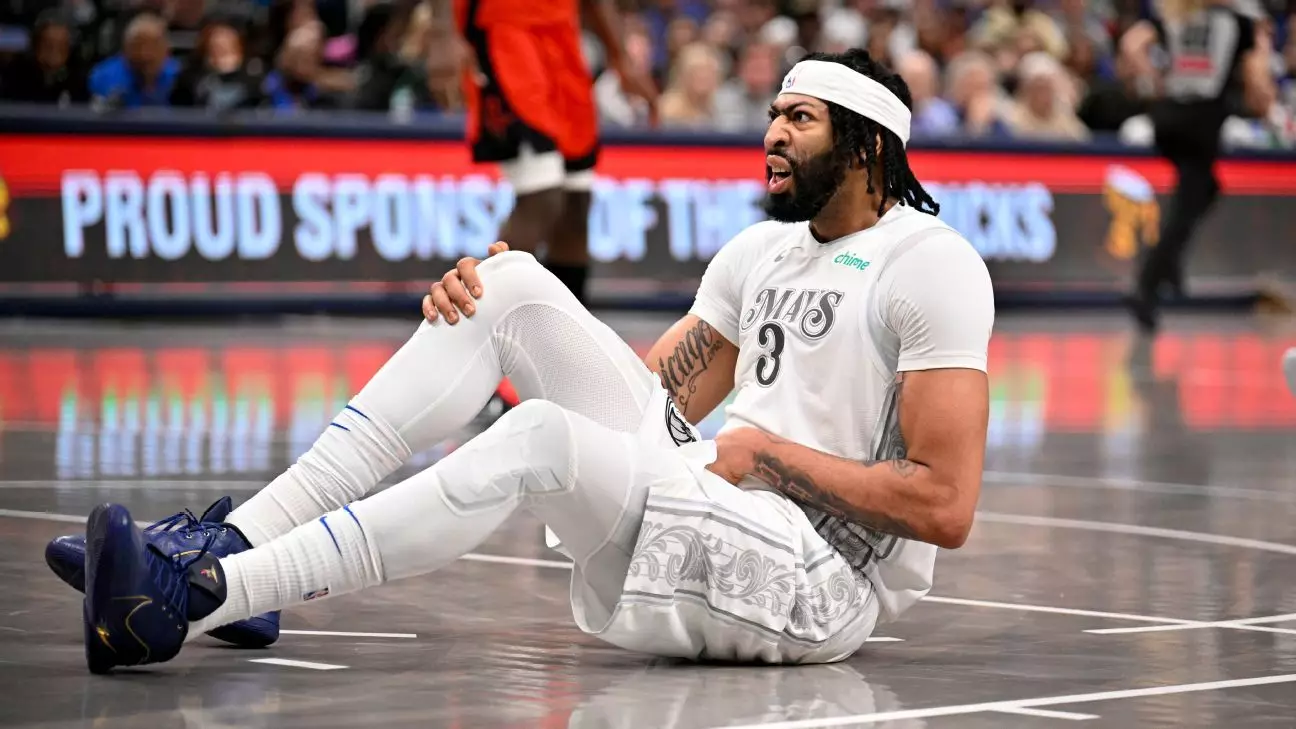The sports world is often filled with exultation, heartbreak, and unexpected twists, and the recent debut of Anthony Davis as a member of the Dallas Mavericks was no exception. This highly anticipated event quickly became a drama when the 31-year-old superstar was sidelined due to a lower-body injury that added a tragic turn to an otherwise electrifying performance.
Davis’ first game donning the Mavericks jersey was meant to herald a new era for the franchise, following a blockbuster trade that saw the beloved Luka Doncic headed to the Los Angeles Lakers. However, this shift in their roster ignited protests from fans, many who felt betrayed by the Mavericks’ management. The atmosphere was charged with expectations, and Davis’ early performance seemed to validate those expectations. He opened the game with a flurry of activity, immediately showing signs of his elite skills and ability to energize the crowd.
In just 31 minutes, he accumulated an impressive stat line: 26 points, 16 rebounds, 7 assists, and 3 blocks. With every dunk and assist, Davis lifted the spirits of the fans in attendance and drowned out some of the pregame dissent. As the game wore on, it appeared that the Mavericks were well on their way to securing a victory against the Houston Rockets, leading comfortably at 116-105. Yet, the excitement of the night was abruptly snuffed out when Davis sustained an injury that left many in the arena gasping in disbelief.
Davis’ injury occurred during a high-stakes moment in the game when he attempted to challenge Alperen Sengun’s driving dunk. The injury not only hindered his play but also left the Mavericks coaching staff in a state of unease as they realized the importance of having Davis healthy. Following the incident, Davis took a trip to the locker room, clutching his midsection, leaving fans to wonder how long he would be sidelined.
While the Mavericks managed to secure a win, the spotlight shifted from the team’s triumph to Davis’ condition. Post-game remarks from the athlete revealed that he had experienced tightness in the area between his groin and quadriceps, fueling speculation about the severity of his injury. “Just the leg got tight, like a little spasm,” Davis noted, suggesting that the injury may not be grave. Nevertheless, the incident raised alarms, especially given Davis’ history with injuries throughout his career, marking yet another episode in his long narrative of fragility.
Dallas Mavericks fans faced a rollercoaster of emotions during this debacle. The mixture of elation from witnessing Davis’ explosive play and the concerns resulting from his premature exit illustrated the dichotomous nature of sports fandom. The atmosphere turned somber as the weight of the future loomed large. General Manager Nico Harrison’s decision to part ways with Doncic sent shockwaves through the fanbase, leading to protests outside the American Airlines Center—an emotional backlash not often seen in the NBA.
The fallout affected the entire organization, as rumors of death threats directed at Harrison emerged in the aftermath. The hard road ahead for the Mavericks is inevitable; rebuilding relationships with a skeptical fanbase and keeping the morale high will be a delicate balancing act for the front office. This incident, coupled with a star player’s uncertain health status, complicates an already tumultuous situation.
As the Mavericks look to navigate this complicated phase, they may need to reassess their strategies moving forward. Davis’ performance, before the injury, bore the hallmark of a player who could elevate the team’s fortunes, yet his health has always been a precarious factor. For Dallas to truly maximize its potential, keeping Davis on the court will be paramount.
The Mavericks now face both a challenge and an opportunity. How they handle Davis’ recovery and the backlash from fans will trend from this moment forward. If the injury turns out to be less severe than initially feared, they could rally their fanbase around Davis’ triumphant return. However, if it results in an extended absence, the organization may enter a state of crisis as they attempt to placate a disenchanted fan community and pursue success without one of their stars.
While Anthony Davis’ debut showcased the potential of this new chapter for the Mavericks, it also highlighted the fragility of sport—a reminder of how quickly joy can transform into apprehension. The coming weeks will be crucial in determining both Davis’ future in Dallas and the franchise’s ability to recover from an emotional upheaval.

